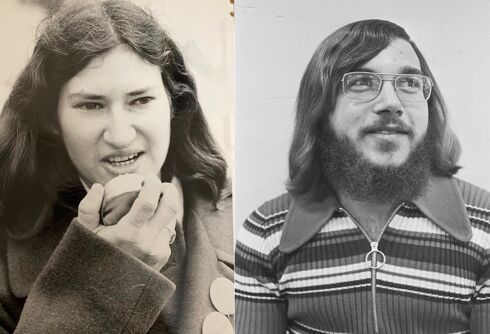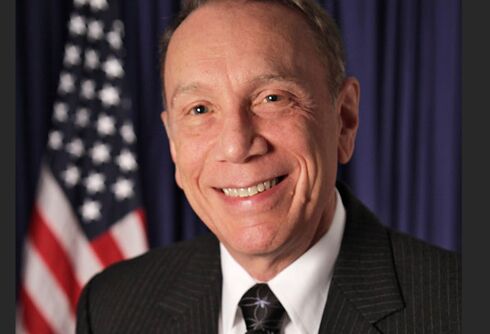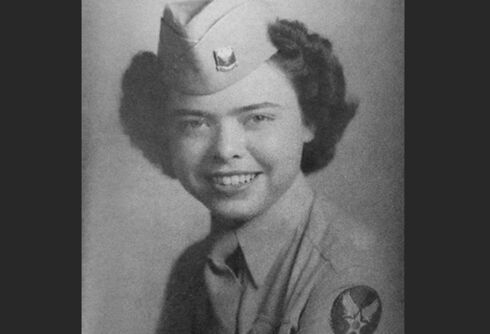I first started teaching myself queer history when I came out to myself in high school, and it opened my entire world. I began to understand how I wasn’t alone. I had entire generations of ancestors stretching out across the centuries who had lived and loved in ways I saw myself reflected in, and their stories validated for me that my feelings were not a phase, made up, or part of an invented trend of the young. Feeling connected to these historical figures and seeing role models in history when I didn’t see many in the media or my personal life showed me the future I could have as a queer person.
This is what I wanted to bring to LGBTQ+ youth when I started my career sharing our history, first with a mobile app 10 years ago and since then speaking to over 200 audiences across eight countries, writing four books for young people, and writing two page-a-day calendars.
Related:
Burmese trans women find freedom & dignity as spirit mediums
Trans women still face discrimination in Myanmar, but while they perform the role of spirit medium, they are temporarily revered.
When I share this heritage, audiences are almost always amazed to learn about the contributions of queer people throughout all of human history. Alan Turing, a gay man, invented the computer that we all use today. Lynn Conway, a trans woman, helped to develop the microprocessors inside our phones and tablets. Glenn Burke, a gay man, co-created the high five. Katharine Lee Bates, a lesbian, wrote the lyrics to “America the Beautiful.” Martine Rothblatt, a trans woman, invented satellite radio. Goodnight Moon and Where the Wild Things Are were written by queer people. Queer people’s contributions to the world are in our everyday lives, straight and cisgender people’s too.
Dive deeper every day
Join our newsletter for thought-provoking commentary that goes beyond the surface of LGBTQ+ issues
Ten years ago, the backlash to sharing this history was nothing like it is today. Our history was barely ever taught in schools and we worked to get it shared there, but lawmakers and individuals were not organizing in these numbers to actively ban it from ever reaching the classroom or library. LGBTQ+ history education has gone from struggling to break out of erasure and silence to becoming a hot-button cultural flashpoint.
According to the Movement Advancement Project, seven states have laws that explicitly censor discussions of LGBTQ+ people or issues throughout all school curricula. Five more require advance parental notification of any LGBTQ+-related curricula and allow parents to opt their children out or require them to opt-in.
Before these legal attacks, LGBTQ+ history was already rarely found in the classroom. According to a 2022 Human Rights campaign survey, less than one in seven LGBTQ+ youth had ever received any LGBTQ+ history education.
Two of my educational books — Queer, There, and Everywhere for teens and Rainbow Revolutionaries for middle graders — have been challenged and removed from specific schools and libraries in multiple states, in addition to not being allowed in the states that have bans on talking about LGBTQ+ people in schools. The places that participate in this censorship remove the ability of librarians and teachers to curate their own collections and curricula as they have been hired to do. They keep youth from learning a complete version of history and lead us down a dangerous path of limiting freedom of speech.
“All students deserve an education that is complete, honest, and accurate,” Rob Sanders, author of several LGBTQ+ history books for children and a former teacher, tells me. “To not be taught the whole of history is to be taught inaccurately. To me, the teaching of LGBTQ+ history is not controversial, but not teaching history accurately and completely sure is.”
According to PEN America, Sanders’s picture book Pride: The Story of Harvey Milk and the Rainbow Flag was tied as the most banned picture book in the U.S. in the 2022 school year.
“I live in Florida, so I know firsthand that books with LGBTQ+ characters, themes, and information are under attack, as are books about and by people of color,” he says. “These books are the main way many teachers are able to incorporate LGBTQ+ history into their classes since they do not have any curriculum that does so.”
Lee Wind, another author of several LGBTQ+ history books for kids and teens, including the banned No Way, They Were Gay?, is also concerned about the organized campaigns to ban books for kids that are about LGBTQ+ or Black history.
“There’s a chilling effect happening, where teachers and librarians have to ask themselves, even if they know the book will help some of their students, is it worth the risk to their jobs?,” he says. “So a lot of books that include diverse and underrepresented voices have a new hurdle to overcome. It’s calculated, it’s politically motivated, and it’s terrible for kids. And it’s impacting authors and publishers, who find we’re selling less books.”
LGBTQ+ books have been censored since they’ve been written, but the “Don’t Say LGBTQ+” laws of the 2020s and the sharp rise in book bans of the last two years are a coordinated surge unlike we’ve seen in a generation, with a particular focus on erasure of our history. The American Library Association recorded more attempts to remove books from shelves in 2022 than ever in their history, nearly double the number from 2021. 2023 numbers are on track to be higher than 2022.
We can fight this erasure by supporting books that have been the subject of bans by buying them, requesting them at libraries, checking them out of libraries, and telling librarians, teachers, school boards, school administrators, and legislators in our communities that we support them. Sanders recommends educating yourself on the books available around the students in your community and helping connect them to those books. Wind says we can all find one story from queer history we connect with and share it with others.
We can thank queer people for Swan Lake, The Nutcracker, West Side Story, Sweeney Todd, A Streetcar Named Desire, A Raisin in the Sun, the Mona Lisa, the David, and the ceiling of the Sistine Chapel. It’s a history to be proud of, and for everyone to know. To hide our history is to deny our existence, to deny our youth the chance to know what our community has given the world and that we have always been here. Access to this representation is life-saving. This LGBTQ+ History Month (October), take action in defense of banned books sharing our history.
Resources for Sharing LGBTQ+ History:
- GLSEN (a nonprofit for LGBTQ+ youth in K-12 schools that provides LGBTQ+ history resources)
- History UnErased (a nonprofit working on bringing LGBTQ+ history to schools)
- Lambda Literary (a nonprofit promoting LGBTQ+ literature with a program that brings LGBTQ+ authors to schools)
- My list of over 350 LGBTQ+ history books
- Outhistory.org (an academic website sharing LGBTQ+ history)
- PEN America (a nonprofit working against book bans)
















